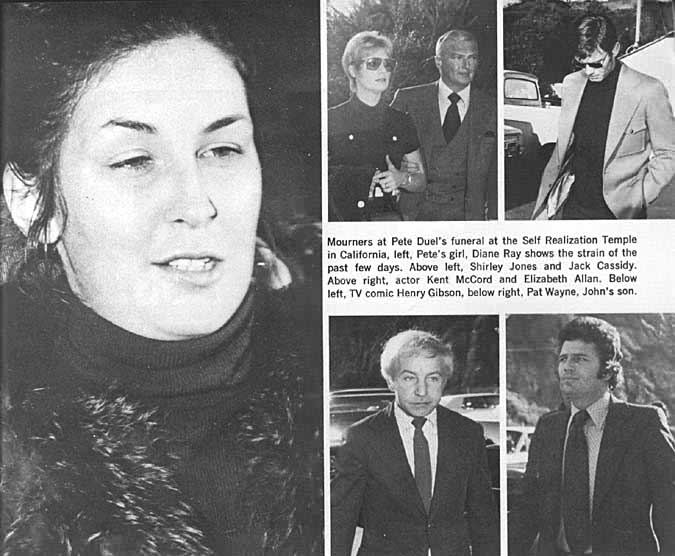
Back to Articles List
In the waning days of 1971, we talked, Pete and I. I was one of the last reporters to talk with him, shortly before the awful tragedy.
He was bowed down by the troubles around him and the troubles within his own heart. "If you're in the public eye, it very often makes for trouble within your private life," he said that day.
"That's something I simply cannot handle. I just emotionally could not handle that."
We'd been discussing today's freer attitudes. "Many people today find they can handle a responsible relationship with their partner and at the same time, maintain another lover." But not Pete. He was a one-woman man who found it easy to be faithful to one love. "A hell of a lot easier than for a lot of people. But everyone knows that to make a relationship work, you have to put an awful lot into it.
"And when you're unhappy with the way you're living your life, if you're not careful, you have a tendency to blame your mate--when you're close to someone...
Pete was "close to someone." He'd found love and he talked of marrying his Diane.
Ironically, Pete seemed to match that happy-go-lucky highwayman he portrayed, but in reality he was not at all like Hannabal Hayes. Ruggedly handsome, with a charm that belied his introspective nature, Pete was a serious, sensitive man--a man who drank too much because the cares of the world were too much with him--who didn't like sentimentality but saw it as a release. "It allows you to sit and cry."
The circumstances of his death made him seem a quitter, yet he was anything but that. There's no doubt he died by his own hand. But it could only have been an accident or a momentary weakness.
When last we talked, he'd been full of plans for a future. He talked in a positive, not a defeatist, manner.
"Love," he said, "means being willing to give as much of yourself as you expect the person you're in love with to give to you. It's the same 'Do unto others' principle on a personal basis, that's what love really is. If you have that--if you practice that--then you are in a love situation.
"With Diane, I find myself taking responsibility more and more. And the more I take, the more I enjoy it, which is a very pleasant surprise to me." The man who cared so much about others had not always understood love, he told me, nor been able to accept it. It had been a long hard upward climb for him. "I'm learning all the time," he said slowly, thoughtfully.
Survival--physical, emotional, personal--was important to Pete. His own, and that of his fellow man.
It was an empathy that ate at his very insides. When he found temporary relief with a few drinks that, too, became a problem in itself and became compounded by the boredom he found in his work. He was a dedicated actor, but his series work brought little challenge, and it pained him to give less than his best effort.
Peter was deeply interested in metaphysics and was a part of the Self Realization Fellowship despite being raised in a more common, more orthodox religion.
"There was a great interest in music in our family," he mused, when we tried to trace the beginning of his interest in a religion that accepts reincarnation as an actuality.
"Coupled with what I considered rather idyllic surroundings--woods and creeks--hills, meadows, farms..." the scenes of his childhood seemed to come alive in his eyes, his words. "I just naturally drifted into that line of thinking," he said quietly.
Our last talk was different. It was a friend-to-friend conversation, with talk ranging from Women's Lib to what he personally looked for in a woman. "I like a woman who is physically attractive, who is somewhat physical herself, who is strong--enjoys the outdoors and she has to be sensitive to the arts. To my work. To philosophy in general. She has to be somewhat metaphysical, because that's what I am."
Pete talked of a role he identified with far more than his series' role. It was the role of an ex-junkie. "He was a loner," he said. "There was much about life he didn't understand--he had a lot of hostility, felt himself misunderstood, the victim of circumstances. I could identify with that."
He, too, had always been a loner--a man with fears and hostilities he didn't understand. Undoubtedly, his own drinking, a problem he couldn't quite conquer, was itself a cry for help from a lonely and fearful man.
Four times he ran afoul of the law because of it and each experience was more traumatic than the one before. Peter Duel tried valiantly, but he couldn't lick that issue.
At the incident of his last citation, there had been an accident, too. It so unnerved Pete that, in his report, the arresting officer seemed to stress his emotional reaction nearly as much as his lack of sobriety.
Peter was trying hard to solve all of his problems. Only months ago, Diane said he was learning to relax. "He's changed," she said. "It isn't playing Hannabal that's done it--it's having moved to this house. Having the garden and the trees which he loves. He can be much freer."
"We can all live and survive," was what Peter had said, hopefully. Optimistically. "You start with two people--for me, it's me and Diane--and you go on from there."
He had much to live for and his own sensitive nature would have been shattered by the violence of his own death.
"Are you happy?" he'd asked me, as a friend. Had the question been prompted by his own unhappiness? Some deep and hidden sorrow even he didn't suspect?
No, there was a simpler reason. It was
an honest interested question, asked by a man who cared about
another human being!
Back
to Articles List